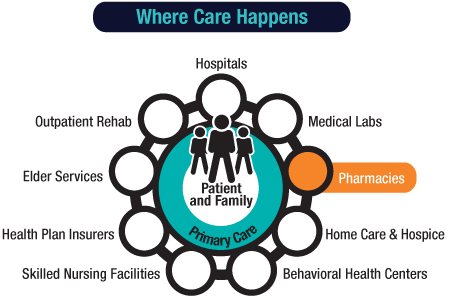
Pharmacies
When you think of a pharmacy, you might picture a place like CVS or Walgreens where you go to pick up medicine. But pharmacies are much more than that. They play a key role in keeping people healthy by helping them understand how to take medications, stay on track with their treatments, and even prevent illness through services like vaccinations.
Pharmacies exist in many different settings—from your local corner drugstore to hospitals and even online—and each plays an important part in the healthcare system.
Different Types of Pharmacies
Pharmacies are located in a wide range of places, and each type serves a different purpose. Here are some of the most common types:
Community Pharmacies (Retail)
These are the most familiar type of pharmacy—located in drugstores, grocery stores, and big retail chains. Examples include:
- CVS Pharmacy
- Walgreens
- Walmart Pharmacy
- Stop & Shop or Big Y Pharmacy
These pharmacies fill prescriptions, sell over-the-counter medicines, provide flu shots and other vaccines, and offer advice on managing everyday health concerns.
Hospital Pharmacies
Located inside hospitals, these pharmacies work closely with doctors and nurses to make sure that patients receive the correct medications while they are being treated in the hospital. Hospital pharmacists also help monitor patients’ responses to treatments and adjust medications as needed.
Clinic or Ambulatory Care Pharmacies
These pharmacies are found in outpatient clinics, urgent care centers, and surgery centers. They help patients who don’t need to stay in the hospital but still require regular medications and close monitoring.
Compounding Pharmacies
These pharmacies prepare custom-made medications for patients who need specific doses, forms, or ingredients that aren’t available in standard products. This is often used for children, people with allergies, or patients who need medications in liquid form.
Online and Mail-Order Pharmacies
Online pharmacies allow people to order their medications from a website and have them delivered to their home. This is especially helpful for people with long-term prescriptions. Examples include:
- Amazon Pharmacy
- Express Scripts
- OptumRx
- CVS Caremark (the mail-order branch of CVS)
Online pharmacies are growing fast and may offer lower prices, automatic refills, and 24/7 access to a pharmacist via phone or chat.
Careers in Pharmacy
If you enjoy science, helping people, and working with technology, a pharmacy career might be a great fit. Here are some key roles:
Pharmacist (Retail or Clinical)
Pharmacists fill prescriptions, provide health advice, and monitor how medications affect patients. They work in drugstores, hospitals, clinics, and even online pharmacies. A Doctor of Pharmacy (PharmD) degree and a state license are required.
Pharmacy Technician
Pharmacy technicians assist pharmacists by preparing medications, handling customer service, and managing inventory. Most complete a certification program or earn an associate degree. Technicians play a growing role in many settings, including retail chains and hospitals.
Consultant Pharmacist
These professionals work in nursing homes, long-term care centers, or insurance companies. They review patient medications and make recommendations to improve safety and reduce costs.
Pharmaceutical Scientist
Pharmaceutical scientists work in labs to discover and test new drugs. They help bring new medications to market and often work for drug companies or research institutions. These careers usually require a master’s degree or PhD.
The Future of Pharmacy Careers
Pharmacy is one of the fastest-growing parts of the healthcare industry. As new medicines are developed and more people gain access to healthcare, the demand for skilled pharmacy professionals is rising.
Technology is also changing the field—automated pill dispensers, electronic prescriptions, and telepharmacy (virtual pharmacy services) are becoming more common. That means future pharmacy workers will need to be comfortable with both healthcare and digital tools.
Whether working at a neighborhood CVS, a hospital pharmacy, or behind the scenes in a research lab, pharmacy professionals play a vital role in keeping communities healthy.
 Healthcare Workforce Partnership
Healthcare Workforce Partnership  REB - REGIONAL EMPLOYMENT BOARD OF HAMPDEN COUNTRY, INC.
REB - REGIONAL EMPLOYMENT BOARD OF HAMPDEN COUNTRY, INC.